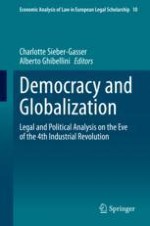This book offers in-depth legal and political analysis concerning the compatibility of the Westphalian state model with globalization and the digital revolution. It explores the concept of democracy in a globalized world, discusses the legitimacy of economic integration in the global market, and presents three case studies (from Brazil, Taiwan and Spain) on the impact of social media on elections. It further entails novel perspectives on the impact of digitalization on national borders, and the role of citizens and experts in the shaping of globalization. A final chapter addresses the extent to which insights gained from the analysis of the abovementioned aspects will need to be considered in efforts to recover from the current global health and economic crisis.
